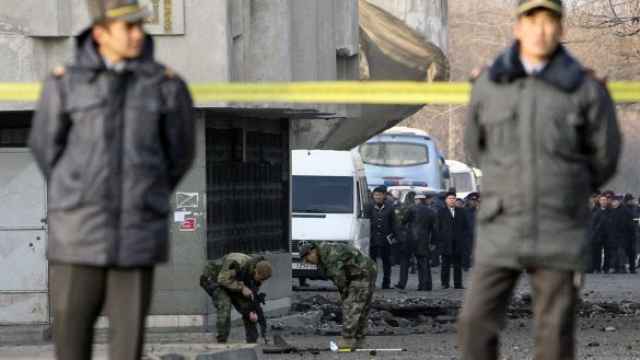BISHKEK, Kyrgyzstan — Kyrgyzstan's new parliament launched a second attempt to build a coalition government Saturday, seeking to avoid repeat elections in the volatile Central Asian state.
President Roza Otunbayeva on Saturday instructed the head of a new political party to form a coalition after the previous alliance collapsed, in a setback to the region's first parliamentary democracy.
Omurbek Babanov, leader of the Respublika party, will have 15 working days to unite three of the five parties in parliament, said Otunbayeva's spokesman, Inasultan Kanazarov.
Kyrgyzstan, a former Soviet republic that hosts Russian and U.S. military air bases, held elections Oct. 10 that resulted in five parties winning seats in a new legislature designed to devolve power from the president to the prime minister.
The vote failed to produce a clear winner in a country where tensions still run high after more than 400 people were killed in June during clashes between ethnic Kyrgyz and Uzbeks.
After weeks of wrangling, three parties agreed on Nov. 30 to form a coalition in an attempt to throw off 20 years of failed authoritarian rule that has twice resulted in the overthrow of a president, most recently in April.
But only two days later, the coalition split when it failed to elect a new speaker. Omurbek Tekebayev, architect of the parliamentary reforms, fell three votes short of the majority required to become speaker.
According to Kyrgyzstan's constitution, three failed attempts would trigger a rerun of elections.
North and South
Analysts said Babanov would have a better chance than others of finding a compromise because his Respublika party has members from both the north and south of a country split by political and clan rivalries and divided by a snowcapped mountain range.
"Respublika has a foot in both camps: north and south," said political analyst Mars Sariyev. "Babanov himself is from the north, so he wouldn't want the coalition to be dominated by southern clans."
In Thursday's vote for speaker, Tekebayev — the only candidate — won only 58 of the 61 votes needed for a majority in the 120-seat legislature. Sources told Reuters that most of those who broke from the coalition were Respublika members.
The failed coalition comprised Respublika, the Social-Democratic Party of Kyrgyzstan and Ata Meken, the party led by Tekebayev.
Ata Zhurt, the southern-dominated party that scored highest in the October election, is opposed to the parliamentary form of government and was excluded from the coalition.
Ar-Namys, a pro-Russian party that finished third in elections, declined to join.
Under the new model of government, backed by the United States but previously criticized by the Kremlin, the parliament will be the country's main decision-making body and the prime minister will assume more power than the president.
A Message from The Moscow Times:
Dear readers,
We are facing unprecedented challenges. Russia's Prosecutor General's Office has designated The Moscow Times as an "undesirable" organization, criminalizing our work and putting our staff at risk of prosecution. This follows our earlier unjust labeling as a "foreign agent."
These actions are direct attempts to silence independent journalism in Russia. The authorities claim our work "discredits the decisions of the Russian leadership." We see things differently: we strive to provide accurate, unbiased reporting on Russia.
We, the journalists of The Moscow Times, refuse to be silenced. But to continue our work, we need your help.
Your support, no matter how small, makes a world of difference. If you can, please support us monthly starting from just $2. It's quick to set up, and every contribution makes a significant impact.
By supporting The Moscow Times, you're defending open, independent journalism in the face of repression. Thank you for standing with us.
Remind me later.





